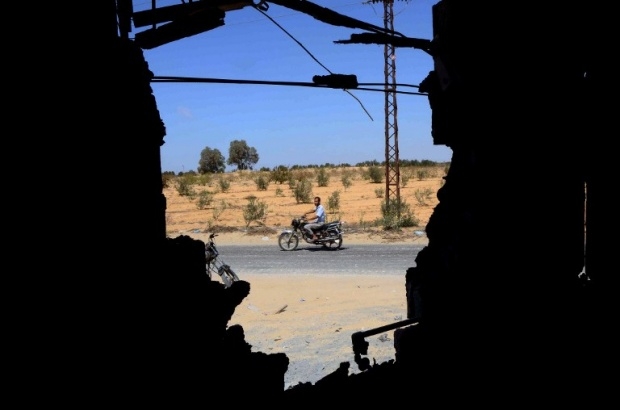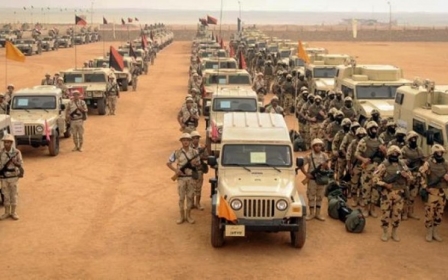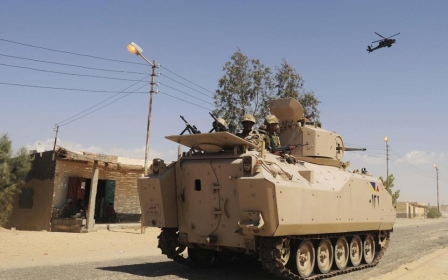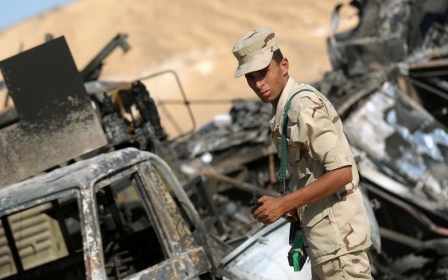Sinai crisis: a timeline of key events since 2007

Egypt’s North Sinai has been wracked by poverty, exclusion and conflict for years. Now, following the killing of near three dozen soldiers earlier in October, a three-month state of emergency has been declared by President Abdel-Fattah al-Sisi.
Nearly half the population have been reported as living in poverty and unemployment stands at near 40 percent for young people between the ages of 20 and 30. Government development projects, designed to improve North Sinai, have made little progress – something local leaders have attributed to a lack of political will from the Cairo government.
Violence has reigned in the governorate – militant groups have found fertile ground to carry out attacks due to a lawless environment while locals have complained of army brutality and high numbers of civilian deaths during supposed counter-terrorism operations.
Here is a timeline of key events going back to 2007, when Bedouin protests erupted out of anger and frustration that authorities were continuing to ignore their needs and even hinder opportunities to develop the land.
-- 2007 –-
April: 2,000 Bedouin stage sit-in on Egypt-Israel border protesting government discrimination – leaders said thousands had been detained after terror attacks from 2004-06 in the peninsula – and requested Ministry of Defence, rather than police, who they said were culturally insensitive and used unjustifiable force against the people there.
June: Bedouin said the Cairo government have blocked locals buying land – due to the Sinai being a focus for developing the tourism industry – and accuse businesses of discriminating against them for jobs, preferring to employ non-Bedouins.
June: Economic development encouraged in North Sinai to take advantage of high youth unemployment – estimated at 25-30 percent, double the national average. Local leaders say Cairo ignored development needs of Sinai.
September: Hamas takeover in Gaza and subsequent Israeli imposed blockade of the coastal enclave - maintained by Egyptian authorities - leads to growth of black market trade with North Sinai – and saw the rise of tunnels connecting the two poverty stricken sides.
-- 2008 --
January: Palestinians pour into North Sinai after blowing up the wall separating the Egyptian side of the Rafah border crossing. Reports said the drive was due to the increasing impoverishment as a result of the Israeli blockade, with many of those crossing over reportedly immediately heading to shops to buy food, medicine and fuel.
November: Violent clashes erupt when a civilian is shot and killed by a police officer – some 80 police are briefly abducted leading to the deaths of three Bedouin.
-- 2009 –-
October: Governor of North Sinai agrees to help facilitate the deliverance of US aid to the troubled area, in order to help address development issues and provide employment opportunities.
December: Egyptian authorities begin work on a steel border fence on the border with Gaza with the stated aim of stopping militants coming from the Palestinian territory into North Sinai – although once completed security officials it is regularly breached as black market trade continues to flourish.
-- 2010 –-
Planned government development projects are revealed to have produced little return, despite funds being available they have not been spent on addressing widespread poverty in North Sinai.
-- 2011 –-
January: A Bedouin protester is shot and killed by security forces, who also fired tear gas at demonstrators calling for President Hosni Mubarak to stand down.
February: Unidentified militant groups blow up the Arab Gas Pipeline – which transports gas to Jordan, Syria and Lebanon from Egypt – forcing authorities to temporarily stop the flow of natural gas to Israel.
August: Operation Eagle launched by Egyptian army to target militant groups after unknown gunmen enter Israel from North Sinai and carry out several attacks against Israeli troops.
-- 2012 –-
January: Ansar Baid al-Maqdis – Supporters of Jerusalem – claim responsibility for a rocket attack on Israel. The militant group – which came to prominence after the 2011 revolution - is also suspected of previous involvement in several attacks in North Sinai.
August: At least 24 Egyptian soldiers and eight militants are killed during battles in provincial capital al-Arish.
August: Operation Sinai is launched by the Egyptian military to fight militant groups in North Sinai – 32 alleged fighters are killed along with two civilians.
-- 2013 --
July: Three separate attacks around al-Arish kill a police colonel, two soldiers, and three factory workers.
August: Egyptian authorities severely restrict Palestinians from crossing through Rafah, as the military intensify their campaign against militant groups in the Sinai.
August: Militants kill at least 25 policemen when gunmen ambushed two busloads of officers with rocket-propelled grenades.
November: A car bomb in the Sinai kills 11 soldiers.
-- 2014 –-
February: Three South Korean tourists and an Egyptian bus driver are killed after a bomb attack near the border town of Taba.
April: An exclusive MEE report found up to 300 people, mostly civilians, have died in a brutal eight-month insurgency campaign in North Sinai by the Egyptian army – Apache helicopters, heavy artillery and rocket launchers are used as entire nomad villages are razed.
May: Only 10 percent of voters in North Sinai turn out to take part in a controversial presidential election that sees former army chief Abdel-Fattah al-Sisi take over power.
September: 11 Egyptian policemen are killed when a roadside bomb blast strikes their armoured vehicle in the Sinai Peninsula. The militant group Ansar Beit al-Maqdis claims the attack.
October 24: At least 26 soldiers are killed in a car bomb attack on an army checkpoint near al-Arish.
October 25: 3 month state of emergency declared in the Sinai by President Sisi.
New MEE newsletter: Jerusalem Dispatch
Sign up to get the latest insights and analysis on Israel-Palestine, alongside Turkey Unpacked and other MEE newsletters
Middle East Eye delivers independent and unrivalled coverage and analysis of the Middle East, North Africa and beyond. To learn more about republishing this content and the associated fees, please fill out this form. More about MEE can be found here.




